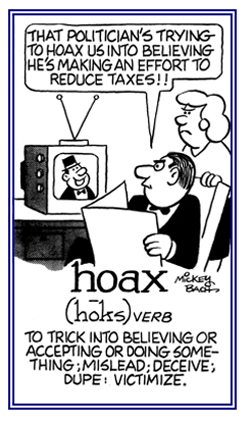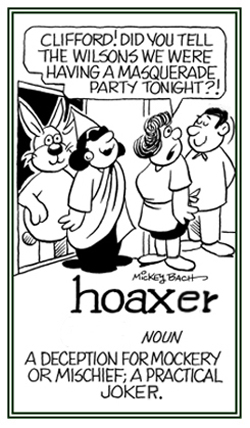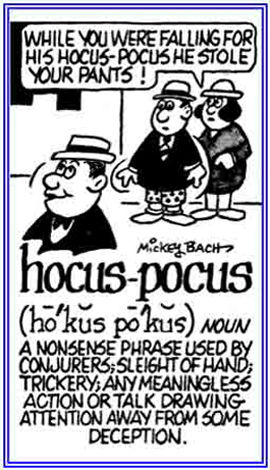hoax, hocus
(hoodwink, deceive, cheat; believed to be from hocus pocus which is probably from a pseudo Latin phrase: hax pax max Deus adimax, that was used by traveling conjurers to impress their audiences)
1. An act that is intended to trick people into believing something is real when it is not: Shelby and Mark recognized the offer in the e-mail as nothing more than a hoax; in fact, there are many spam messages that are nothing more than hoaxes.
2. Something that has been established or accepted by fraudulent means: The bomb threat was thought to be a hoax; however, the residents of the apartments were still told to evacuate the building.
3. A person who is the subject of a playful joke: Adele was the victim of a cruel hoax when she was told that she had won a million dollars in a lotto drawing.
2. Something that has been established or accepted by fraudulent means: The bomb threat was thought to be a hoax; however, the residents of the apartments were still told to evacuate the building.
3. A person who is the subject of a playful joke: Adele was the victim of a cruel hoax when she was told that she had won a million dollars in a lotto drawing.
hoax (verb), hoaxes; hoaxed; hoaxing
1. To trick people into believing that something is real when it is not: Too many people are being hoaxed by e-mails into believing that they will receive a lot of money if they respond to the sender.

© ALL rights are reserved.
Go to this Word A Day Revisited Index
A radio audience was hoaxed into believing that Martians had landed on earth and some people actually thought it was true.
2. Etymology: the term hoax is believed to be from hocus or something spoken quickly and there is also hokum, which is a blend of hocus-pocus and "bunkum" or "bunk".
Go to this Word A Day Revisited Index
for a list of additional Mickey Bach illustrations.
hoax (adjective), more hoax, most hoax
A reference to making humorous or malicious deceptive actions: The neighbor's son was accused of making hoax calls to Jim's family.
A person who tricks or deceives people: In some places, hoaxers not only use the internet, but they also use the phone to trick people into believing phony offers.

© ALL rights are reserved.
Go to this Word A Day Revisited Index

Go to this Word A Day Revisited Index
for a list of additional Mickey Bach illustrations.
1. Mindless conjecture, that which is false or insincere: For some people, hokum is a term for "nonsense"; so, it is just so much balderdash and it is considered to be unreliable information.
2. Foolish or untrue words or ideas; meaningless: Most people know that the Jeffrey's story about what happened to him is pure hokum.
2. Foolish or untrue words or ideas; meaningless: Most people know that the Jeffrey's story about what happened to him is pure hokum.
Someone who cheats or deceives other people: It took a long time, but the police finally caught up with Tommy, the hocus, who had been accessing people's credit card information at the restaurant where he worked and spending their money for his own desires.
hocus (verb), hocuses; hocused; hocusing
1. To fool or to deceive: Some people claim that their government is hocusing and cheating them of their retirements.
2. To infuse or adulterate (food or drink) with a drug; to stupefy with drugged liquor: Roy hocused the drinks of some of his guests because he wanted to stupefy them out of revenge for what they said about him at work.
2. To infuse or adulterate (food or drink) with a drug; to stupefy with drugged liquor: Roy hocused the drinks of some of his guests because he wanted to stupefy them out of revenge for what they said about him at work.
1. Words without meaning or a phrase used to draw attention away from and to disguise what is really happening: Lucinda accused her psychologist of using a lot of hocus-pocus to make her think that she was playing games with herself.
2. A trick performed by a magician or juggler; a sleight of hand: The abracadabra and hocus-pocus words are used to draw the attention of viewers to what the performer is about to present.
3. A term used especially to promise something with deception or dishonest methods that are used to trick people: The politician misled voters with his political hocus-pocus of promising lower taxes and higher wages for workers.
4. Etymology: there is no real proof that hocus-pocus is a blasphemous corruption of the first words of the consecration in the Catholic Mass, Hoc est corpus, "This is the body"; but there are those who believe that the term is simply what the Oxford Dictionary calls a "sham (fraud) Latin" phrase invented by a magician to distract the audience while working his legerdemain or sleight of hand and to show his skill or deceitful cleverness.

© ALL rights are reserved.
Go to this Word A Day Revisited Index
2. A trick performed by a magician or juggler; a sleight of hand: The abracadabra and hocus-pocus words are used to draw the attention of viewers to what the performer is about to present.
3. A term used especially to promise something with deception or dishonest methods that are used to trick people: The politician misled voters with his political hocus-pocus of promising lower taxes and higher wages for workers.
4. Etymology: there is no real proof that hocus-pocus is a blasphemous corruption of the first words of the consecration in the Catholic Mass, Hoc est corpus, "This is the body"; but there are those who believe that the term is simply what the Oxford Dictionary calls a "sham (fraud) Latin" phrase invented by a magician to distract the audience while working his legerdemain or sleight of hand and to show his skill or deceitful cleverness.

Go to this Word A Day Revisited Index
so you can see more of Mickey Bach's cartoons.
hocus-pocus (interjection)
A phrase that is used as a recitation that is supposed to present a magic act or spell: James Jones often used the words hocus-pocus when he was entertaining people with his slight-of-hand or so-called magical presentations at the night club.
<img src="/img/left_arrow_sm.gif" alt="" /> <img src="/img/right_arrow_sm.gif" alt="" />
Showing 1 page of 9 main-word entries or main-word-entry groups.
